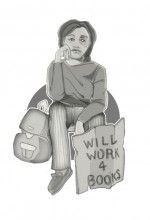With the dawn of a new semester, many Aggies are feeling the pain of bank accounts that have suddenly dwindled. Rent payments, tuition bills and other expenses are piling up and draining the bank accounts of students. One significant expense that greets the start of this and every semester is the textbook bill. With many new textbooks carrying prices of over $100, it is no wonder why the trip to the bookstore is a dreaded start-of-semester ritual. Although changing the practices of publishers is a difficult task, the state and students must work together to help alleviate the problem.
Textbook publishers are primarily to blame for the exorbitant prices of textbooks. According to a report released last year by the California Public Interest Research Group (CALPIRG) titled “Rip-off 101: How the Current Practices of the Publishing Industry Drive up the Cost of College Textbooks,” textbook publishers engage in several practices that raise the prices of textbooks and do little to benefit students. One of the most prevalent practices is the barrage of new editions of textbooks, even if there are few, if any, substantive revisions. Over half of the faculty members surveyed by CALPIRG reported that new editions of textbooks are “rarely to never justified.” The release of new editions of textbooks forces the less expensive, used versions of the textbook off the market, resulting in a significant cost increase for students.
The report also discussed the growing practice of bundling supplementary materials, such as CD-ROMs, with college textbooks. These materials, which often add to the price of the textbooks, are unnecessary in many cases. Over 65 percent of faculty surveyed said they rarely or never use these materials in their classes. Since they are included with the textbook, students are forced to absorb the cost for materials that they likely will never use.
The problem of textbook prices has attracted the attention of some members of the Texas Legislature. State Rep. Aaron Pena recently filed HB 257, which would exempt college textbooks from sales tax. While it would not have a direct impact on the sticker prices of textbooks, the tax exemption would deliver a small, though much needed, cost break to college students. Should this exemption become law, students in College Station would save $41.25 on a $500 textbook purchase. While similar attempts at tax-free textbooks have been unsuccessful, recent media attention given to the increasing unaffordability of higher education may serve as an impetus to pass this bill. However, students must get involved in this issue and voice their support for tax-free textbooks for this bill to succeed.
Some Aggies have taken matters into their own hands to combat the high prices of textbooks. Three semesters ago, students in the Texas A&M chapter of the Mechanical and Electrical Contractors Association (MECA) were fed up with having to pay too much for textbooks for classes in the Construction Science Department and decided to do something about it.
The result was a large board in the Langford Architecture Center, listing every class offered in the Construction Science Department, with space for students in those classes to sell their textbooks to other students. According to MECA President Tom Sexton, students in approximately 90 percent of construction science classes have used the board to buy and sell textbooks. This has allowed for a mutually beneficial exchange for students in the Construction Science Department where students can sell their books for more than they would get from a local bookstore, while at the same time allowing students to buy textbooks for less than the bookstore’s price. “We take care of our own,” said Sexton, commenting on the board’s popularity.
Students in all other departments should emulate the example set by the Construction Science Department. Aggies should take care of each other. By bypassing bookstores whenever possible, we can help each other out and save us some much-needed cash. If students act to make a change, perhaps we will soon see textbook boards like the one in Langford in classroom buildings all across campus, and textbook prices may be driven to a number more palatable to students.
Text message
January 18, 2005

0
Donate to The Battalion
Your donation will support the student journalists of Texas A&M University - College Station. Your contribution will allow us to purchase equipment and cover our annual website hosting costs.
More to Discover








